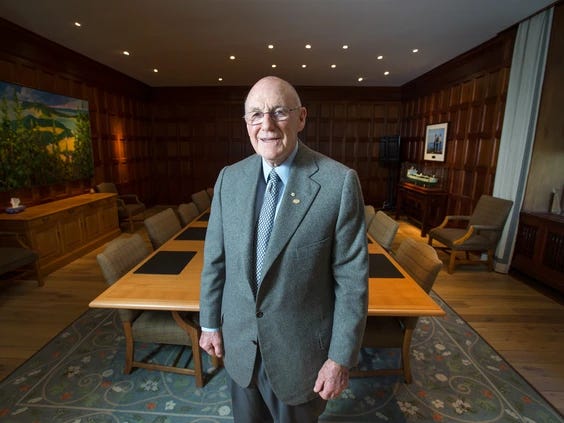The Demise of the Emperor of New Brunswick
by Christopher Wanamaker
Arthur Irving, the billionaire chairman emeritus of Irving Oil, has died at 93. Tributes are pouring in. He is described as a man who achieved the status of corporate top dog at his family oil company, as someone with endless energy and dedication, known for giving 110 percent to his hometown of Saint John, New Brunswick; a lifelong Saint Johner who oversaw the growth of his father’s oil company into a multinational energy firm... with "tremendous" contributions over the years.
Not only that, but according to several obsequious obituaries Irving was a true New Brunswicker who always put New Brunswick first -- a life long champion of the province. As well, he touched countless lives and even in death will continue to inspire generations to come.
One obituary says that despite his high status in the community he shook the hand and remembered the name of every person he met, believing in the importance of every customer.
In case all this fails to impress, he is also described as someone who has had a lasting impact, leaving an “immeasurable legacy...with vision and unwavering commitment to the city of his birth, a deeply committed philanthropist to environmental and post-secondary education."
Unfortunately, the tributes don’t account for the many criticisms and controversies that have engulfed Mr. Irving over the years. They have included concerns about the greenhouse gases emitted by the Irving Oil refinery, the largest refinery in Canada, also the largest emitter of these gases in the province; the tax evasion stories; the union busting that happened to dry dock workers in the 1990s; the Irvings’ ties to successive Conservative and Liberal governments and especially to the present New Brunswick premier, Blaine Higgs, a former executive of the Irving empire; and the family’s long-term ownership of all major New Brunswick media, on which the Irvings continue to exert great influence.
(Premier Higgs worked as an executive of the Irving empire for the company during a long strike at the Irving Oil Refinery from 1994 to 1996.) Tax evasion is a big story too. CBC obtained leaked documents that show the family created an offshore insurance company that allowed them to move millions of dollars in profits out of Canada and into the tax haven of Bermuda.
By the early 1990s the Irving group of companies included thousands of Irving service stations in eastern Canada and northeastern United States, transport companies, forest industry operations, pulp and paper mills, newspaper, radio, and TV companies, Canada’s largest oil refinery, a modern shipyard, and the first deep-water terminal in the western hemisphere. One in 12 people in New Brunswick work for Irving.
Irving companies have benefited from millions of dollars of federal and provincial subsidies, taxpayer-funded government contracts and tax concessions over the years. The extent of Irving Oil control has led some to call the province a “captured state.”
Public criticism also notes the yawning gap between the huge reach of the Irving empire and the growing inequality, poverty and homelessness evident in the province and in Saint John. The obituaries also, of course, do not acknowledge the famously dysfunctional nature of the Irving family itself.
The contrast between the pretentious accolades accorded Arthur Irving and the reality of the Irving empire has never been greater.


